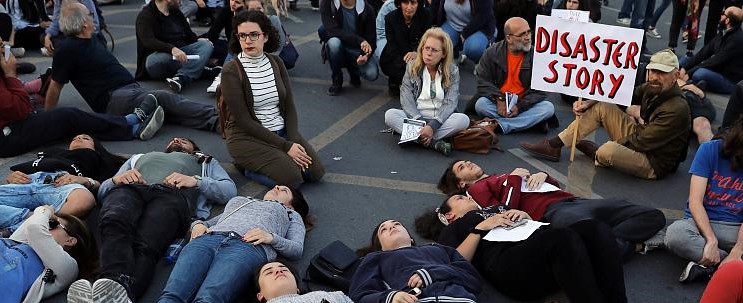
Violent employer, while hitting the domestic worker: clean up and get lost!
Domestic worker: where can I go?
Violent employer: go wherever you want. Take the bus, go to Nicosia, go where whores are. I don’t want you here!
The above conversation sums up most explicitly the painful set up of the employment policy and protection framework of domestic workers in Cyprus.
For two days now, public opinion is faced with a new incident of gender-based violence, inhuman and humiliating treatment. Based on the video circulated on social media, the Cypriot employer who, according to posted information, is an ex-police officer, appears to brutally abuse his domestic worker from the Philippines, for reasons related to her right to private life and about which he did not have the right even to know, let alone to judge.
KISA welcomes the immediate response of the police for locating and arresting the perpetrator, who, we hope, will be prosecuted and made an example of for the criminal offences and gender-based violence he has used. However, the fact that the police have not issued a detention order for that person for the purpose of protecting the investigation procedure raises questions, especially as the victim is in a particularly vulnerable positon and the perpetrator is in a power relation vis-à-vis the victim, and without, as it appears from what has been published, also any orders for restricting communication by the perpetrator with his victim.
Also questionable is the fact that the migrant woman has not been placed under protection, does not appear to have been referred to the shelter for victims of domestic violence but appears to be simply under the protection of a domestic workers agent in Cyprus.
Responsible for the perpetuation of this situation are also the law enforcement authorities but also the Social Welfare Services. For the purpose of the implementation of the Domestic Violence Law, domestic workers are considered as members of the family for which they work and reside with. However, despite our repeated actions, todate, instead of prosecuting the perpetrators according to the Domestic Violence Law they continue to prosecute them according to the common criminal code, which provides for lighter penalties and conviction is harder to achieve.
The above indicate most vividly that the Istanbul Convention on combating all forms of violence against women remains a dead letter and a theoretical framework invoked when and as it is suitable at any moment, but without being in effect substantially and effectively implemented
KISA considers that it is urgent to deal substantially and radically with the violations of the rights and protection from violence of migrant women in Cyprus. The employment policy of domestic workers, lack of substantial information and effective protection infrastructure, renders migrant women prey to gender-based violence, systematic violation of their labour rights and exploitation by various networks thriving as a result of the gaps created and allowing them to exploit by the competent services, systematic discrimination and policies of this country.
The Anastasiades government, under the pressure of the climate formed after the failure to timely detect and track down the serial killer a year ago, announced the intention of a public consultation with all stakeholders in order to formulate a new framework of employment and protection of domestic workers and migrant women in general. Unfortunately, after Metaxa’s swift confession and conviction the issue has disappeared from the mass media and the government has once again forgotten its announcements and commitments.
KISA, on the occasion of this new incident, is publishing the positions and proposals it prepared in the context of the government’s announcement for a public consultation and which it has never been able to discuss with the competent authorities as they, until today, reject this dialogue.
KISA calls for the immediate, transparent and objective investigation of the criminal offences the suspect has been charged with, the protection and empowerment of the victim according to the obligations deriving from the relevant legislation for the rihgts of victims but also from the ratification law of the Istanbul Convention, and for opening a dialogue for changing at last the state’s migration policy, which has remained the same, in its basis and philosophy, from 1990 to date.
Steering Committee





